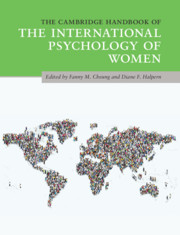Book contents
- The Cambridge Handbook of the International Psychology of Women
- The Cambridge Handbook of the International Psychology of Women
- Copyright page
- Dedication
- Contents
- Figures
- Tables
- Contributors
- Acknowledgments
- Section 1 The Underpinnings of Sex and Gender and How to Study Them
- 1 International and Intersectional Perspectives on the Psychology of Women
- 2 Feminist Theory and Methodologies
- 3 The Contents and Discontents of the Nature–Nurture Debate
- 4 Sex, Gender, and Sexuality
- 5a Sex Differences on the Brain
- 5b Sex/Gender Differences in the Brain and their Relationship to Behavior
- Section 2 Developmental Perspectives of the International Psychology of Women
- Section 3 Cognitive and Social Factors
- Section 4 Work and Family Issues
- Section 5 Inequality and Social Justice
- Section 6 Health and Well-Being
- Epilogue Some Final Thoughts and Take-Home Messages
- Index
- References
3 - The Contents and Discontents of the Nature–Nurture Debate
from Section 1 - The Underpinnings of Sex and Gender and How to Study Them
Published online by Cambridge University Press: 20 July 2020
- The Cambridge Handbook of the International Psychology of Women
- The Cambridge Handbook of the International Psychology of Women
- Copyright page
- Dedication
- Contents
- Figures
- Tables
- Contributors
- Acknowledgments
- Section 1 The Underpinnings of Sex and Gender and How to Study Them
- 1 International and Intersectional Perspectives on the Psychology of Women
- 2 Feminist Theory and Methodologies
- 3 The Contents and Discontents of the Nature–Nurture Debate
- 4 Sex, Gender, and Sexuality
- 5a Sex Differences on the Brain
- 5b Sex/Gender Differences in the Brain and their Relationship to Behavior
- Section 2 Developmental Perspectives of the International Psychology of Women
- Section 3 Cognitive and Social Factors
- Section 4 Work and Family Issues
- Section 5 Inequality and Social Justice
- Section 6 Health and Well-Being
- Epilogue Some Final Thoughts and Take-Home Messages
- Index
- References
Summary
Which more importantly contributes to who we are and how we behave, biological influences or socio-cultural–environmental influences? This question reflects the essence of the “nature–nurture debate,” as traditionally defined. This debate and its appropriate resolution have important implications. At the same time, the nature–nurture debate is not profitably framed in this traditional way. The traditional framing implicitly assumes that “biological” and “environmental” causes – “nature” and “nurture” – constitute separable causes, as, say, pieces of a pie can be sliced apart and separated. In fact, they are not separable. To understand the effects of “nurture,” one must understand outcomes of “nature.” Within a reframing of the nature–nurture debate, one can ask a number of questions about the roles that nature and nurture play. We describe these questions. And we discuss some implications for understanding the sexes and, specifically, women.
- Type
- Chapter
- Information
- Publisher: Cambridge University PressPrint publication year: 2020
References
Suggested Readings

Steven Gangestad is Distinguished Professor of Psychology at the University of New Mexico. He received his BA from Stanford University and his PhD from University of Minnesota. His research covers topics in evolutionary behavioral science, primarily on processes that affect human romantic relationships, which he has largely explored through frameworks inspired by evolutionary biology. He has published over 130 refereed journal articles with 26,500 citations, h-Index = 70, Google Scholar. He is currently Associate Editor of Psychological Science.

Lei Chang is Chair Professor of Psychology and Head of Department of Psychology, University of Macau. Born in China, Chang received his BA from Hebei University and his PhD from University of Southern California. He has previously taught at the University of Central Florida and the Chinese University of Hong Kong. He conducts research in the areas of evolutionary psychology, including cultural evolution, life history, and mating research, and developmental psychology focusing on parenting, and child and adolescent social development. He has published over 200 refereed journal articles (70% in English outlets) with over 16,000 citations, h-Index = 54, by Google Scholar.

